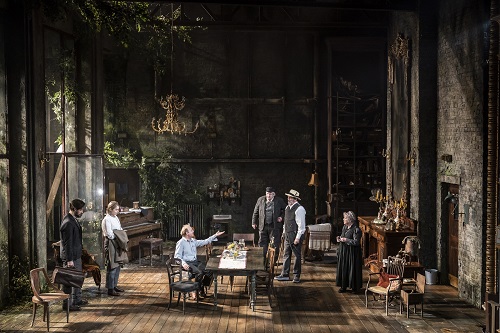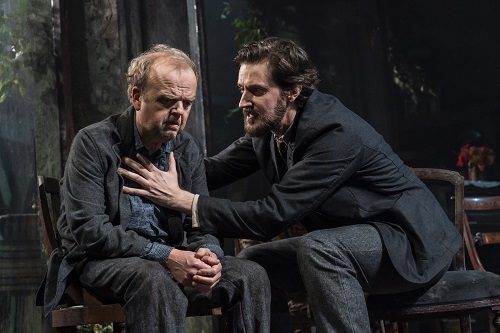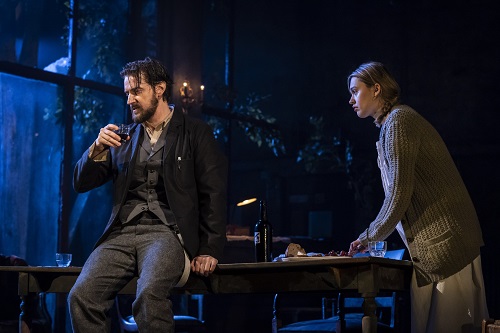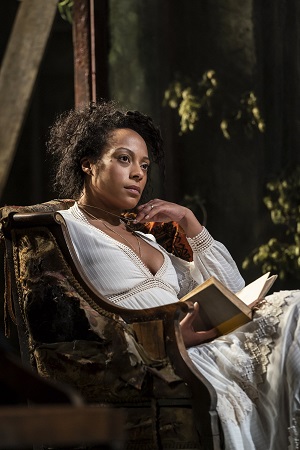 United Kingdom Chekhov, Uncle Vanya: Harold Pinter Theatre, London, 23.1.2020. (CS)
United Kingdom Chekhov, Uncle Vanya: Harold Pinter Theatre, London, 23.1.2020. (CS)

Production:
Ian Rickson – Director
Conor McPherson – Adaption
Rae Smith – Designer
Bruno Poet – Lighting Designer
Stephen Warbeck – Music
Cast:
Vanya – Toby Jones
Astrov – Richard Armitage
Yelena – Rosalind Eleazar
Sonya – Aimee Lou Wood
Nana – Anna Calder-Marshall
Grandmaman – Dearbhla Molloy
Telegin – Peter Wight
Professor Serebryakov – Ciarán Hinds
“I love life as such – but our life, our everyday provincial life in Russia, I just can’t endure. I despise it with all my soul.”
When the rural doctor Astrov voices his dissatisfactions to Sonia – who, with her Uncle Vanya, has been slaving to generate sufficient money from the family’s fading country estate to sustain her father’s life of scholarly idleness – he brings the heart of Chekhov’s Uncle Vanya to the fore: “The peasants are all too much alike, undeveloped, living in squalor. The educated people … are shallow in thought, shallow in feeling, unable to see further than their noses – or to put it quite bluntly, stupid.”
Astrov embodies what one might argue is the essential theme of Chekhov’s plays. He has courage, he has hopes, but the destruction of beauty by those who are blind to it denies him, and them, self-fulfilment. Moreover, this yearning cannot be separated from the changes being wrought on provincial Russia: the decline of the landed gentry, and the conflict between rural and urban. The ubiquitous unhappiness and frustration derive from both the characters’ own defects and from the economic and social conditions, exposing the futility of the talents and dreams of those such as Vanya and Astrov, whose lives are rendered stagnant and stupefying.

Conor McPherson’s new adaptation for Ian Rickson production of Uncle Vanya, which has opened at the Harold Pinter Theatre, brilliantly captures the aching disappointment and yearning which pushes Chekhov’s characters into vulgarity, pettiness and self-absorption. But, it rather detaches their unfulfillment from its context. There is little sense of either a socio-economic context – one would not guess that Telegin (Peter Wight) was a poverty-stricken landowner – or a particularly Russian locale. Even the samovar, whose operations are disrupted by Professor Serebryakov’s self-indulgent timekeeping, causing great distress to the household distress – might be any old tea urn. Costumes confirm the ambivalence of time and place. The peasant garb of old Nana (Anna Calder-Marshall), the children’s former nurse, suggests the late-nineteenth century, yet the matriarch Mariya (Dearbhla Molloy) dons slacks and holds her cigarette imperiously, while Yelena’s figure-enfolding dresses and Vanya’s scruffy shirt evoke ‘anytime’.
It’s beautiful to look at, though. Rae Smith’s set – which she prefers to term an ‘installation’ or ‘space of ideas’, a ‘manifestation of Chekhov’s mental landscape’ – removes the boundaries between internal spaces and creates one vast atrium, a collage of decorum and decay, with emblems of gentility unsettled by exposed pipework. There are gestures of realism: topped with a linen tablecloth and candles, the wooden kitchen table becomes a grander piece of dining furniture; a music room is suggested by a piano stage-right; one corner is crammed with tilting shelves of higgledy-piggledy books, intimating the library; Vanya’s bureau, its drawers stuffed with papers and files, lurks to the rear. Outer encroaches on inner as foliage curls in through the broken glass, through which we see a shadowy garden, wrapping itself around the lacklustre chandelier.
The design captures both the melancholy and the claustrophobia that consumes the characters. No wonder that Astrov impetuously runs out into the storm. Bruno Poet’s lighting wonderfully conveys the destabilising effect that the arrival of Serebryakov (Ciarán Hinds) and his young second wife Yelena (Rosalind Eleazar) has upon the house. Night and day are overturned, no one can sleep, mealtimes are muddled. What Smith and Rickson do not do, however, is show how in Uncle Vanya Chekhov uses setting to illuminate Vanya’s despair, taking the audience from the garden to the dining room, on into the living-room and finally into Vanya’s own room-cum-estate office, thereby emphasising the characters’ irresolvable isolation. Instead, it’s the fact that the characters can’t get away from each other that seems to be the problem.
On the whole, McPherson’s adaptation is sensitive and persuasive. Only a Chekhov purist might complain about the occasional modern colloquialism – Vanya is fed up with all this “wanging” about – and the expletives, though uncharacteristic of Chekhov’s landed gentry, do suggest repressed tension and anger on the cusp of exploding. I was less taken with McPherson’s decision to turn some of the characters’ introspective ruminations into explicit addresses to the audience: they don’t need to directly ‘explain’ their suffering to us in this way, we can discern it from the subtleties of their words. There’s also rather too much rough humour for my liking though McPherson is a master of the bathetic one-liner and the cast’s droll comic timing serves him superbly.
Rickson seems concerned to inject moments of energy which are not present in the original, which instead communicates the monochrome ordinariness of commonplace life through subtle verbal intimation rather than grand dramatic gesture. Thus, when Sonia returns from her walk in the garden, she finds her Uncle Vanya dipping his hand into a glass of water and frantically trying to rub out a stain on the crotch of his trousers. Telegin’s speech defending his integrity – “I’ve lost my happiness, but I’ve still got my pride.” – culminates with a vigorous dash across the room and a foot stamped on a chair, defiance replacing the quiet tearfulness indicated by Chekhov. Similarly, when the storm arrives, the inebriated Astrov tears off his shirt and shoes and dashes into the dark deluge, inspiring Telegin to fling down the guitar and follow him in semi-naked misadventure. When shortly after Sonia interrupts the men’s nocturnal drinking session, during which Vanya climbs into the drinks cabinet in search of further supplies, Astrov rushes from the room, returning fully clothed. Chekhov’s social point, that the doctor is caught without his tie and waistcoat, is lost in the physical humour, along with the Chekhovian ‘mood’.

Despite these ‘criticisms’, one can’t deny that, while one may feel that it isn’t really ‘Chekhov’, this is still a wonderful and compelling production. Toby Jones captures Vanya’s heart-breaking blend of bitter self-excoriation and elegiac self-belief: “If I had had a normal life, I might have been a Schopenhauer, a Doestoyevsky … Oh, I’m taking rubbish!” He denounces Serebyakov as a charlatan – he’s a nonentity, “a soap bubble” – but can’t create the theatrical ‘pop’ that would clinch his argument. At times ridiculous, Vanya never loses the audience’s compassion; we laugh with him when he is forced to reveal that he has hidden the bottle of morphine stolen from Astrov in his underpants. His spirit is as crumpled as his dishevelled shirt, yet despite his unkempt hair and untucked shirt, Jones conveys Vanya’s inner dignity, and when he begs Astrov to tell him how to begin again, how to live through the coming years, I defy you not to have a lump in your throat.
Richard Armitage’s sober jacket and medical holdall cannot suppress Astrov’s restlessness and inner passion. I was disappointed, however, that the production seemed to equate Astrov’s desire to replant the local forests with present-day environmentalism, though a parallel between modern fears of environmental disaster might have been more persuasive it had been linked to social and economic inequality and conflict. Though the nod towards climactic change is a mild one, it jarred, seeming to misrepresent, or at least ignore, Astrov’s true vocation and vision. For, his monologue, like that of Tusenbach in The Cherry Orchard, presents the trees as a symbol of the destruction of beauty in a Russia which must change. To present rural life realistically, Chekhov had to depict rising capitalist forces, however much he may have lamented their effect.

Thus, in Act 1, Astrov berates Sonya (Aimee Lee Wood) and Vanya that the woods of Russian are trembling under the axe, engendering wildlife and its habit, because people are too lazy and stupid to stoop and pick up fuel from the ground. And, in Act 3 he evangelically lectures Yelena, showing her a map “our country as it was fifty years ago. The green tints, both dark and light, represent forests. … Here on this lake, lived great flocks of swans and geese and ducks; as the old men say, there was a power of birds of every kind. Now they have vanished like a cloud”. But, such loss and damage are primarily of spiritual import for Astrov: they are a sign, not of the effect of industrial progress – no roads have been built through the ruined woods – but of the nation’s destruction of its own beauty, and with it its dignity: “We are confronted by the degradation of our country … almost everything has gone, and nothing has been created to take its place.”
He is disappointed by Yelena’s apparent lack of interest: she is after all a city dweller who has merely ‘read about’ the country – thereby underscoring the play’s opposition of urban and rural. But, we are reminded of his earlier words about the spiritual beauty which is lacking in Yelena: “A human being should be entirely beautiful: the face, the clothes, the mind, the thoughts. She is, of course, beautiful to look at, but … she does nothing but sleep and eat and walk and bewitch and that is all. She has no responsibilities, everything is done for her … and an idle life can never be a pure one.”
McPherson and Rickson may not have intended to suggest that Chekhov was a climate activist ahead of his time, but the removal of the historical context produces this effect. Moreover, Yelena herself is presented with more tenderness and sincerity than is often the case. Eleazar is paradoxically both languorous – lying prone along the table-top, slumping in a chair with book in hand and eyes glazed – and unsettled, seething with desires that she dare not acknowledge but cannot quite suppress. These inner forces erupt upon Astrov’s departure: she flies across the room and leaps into the doctor’s arms, wrapping her legs around him. The besotted Vanya’s entrance, bearing roses that he has plucked for her from the garden, is painful. Eleazar gives a radiant performance; if I had any small quibble, it would be that I did not feel that she captured the destructiveness of Yelena, who is accused by Astrov of having infected the entire household with her indolence. Hinds is fierce and imposing, menacingly so, before Serebryakov’s patriarchal bluster is exposed as impotent.
Aimee Lee Wood captures Sonya’s gaucheness and essential goodness. Sadly, Astrov does not see spiritual beauty when it is staring him in the face: the moment when Sonya raises her face to kiss him and, with a quick swivel, he plants a kiss on top of her head, is heart-wrenching. On the whole, McPherson retains the lyricism of Sonya’s lyrical dreams and reflections, but on one occasion a change in register irked. Sonya asks Astrov what he would say if she had a friend or a little sister who was in love with him; his reply is that he would tell the young woman that he could not love her. Alone, Sonya wonders why, despite his words, she feels so happy, rueing only that she is so plain. McPherson puts words of regret into her mouth, as she laments that she spoke out and has made a fool of herself – a rare off-key moment.
He and Rickson get the end just right though. Sonya and Vanya return to the account books, romance forgotten as they immerse themselves in financial matters and the dull routines of ordinary life. But, for Sonya the dreams have not died, they have merely been displaced – to the next world. Wood spoke Sonya’s final lines with a fervour which was both pure and dynamic, exulting in her vision of angels and the “diamonds of heaven” that await them in unearthly paradise. Yet, at the close, neither Astrov’s utopian idealism, nor Vanya’s resigned pragmatism, nor Sonya’s ecstatic faith seemed adequate to overcome human frailty.
Claire Seymour